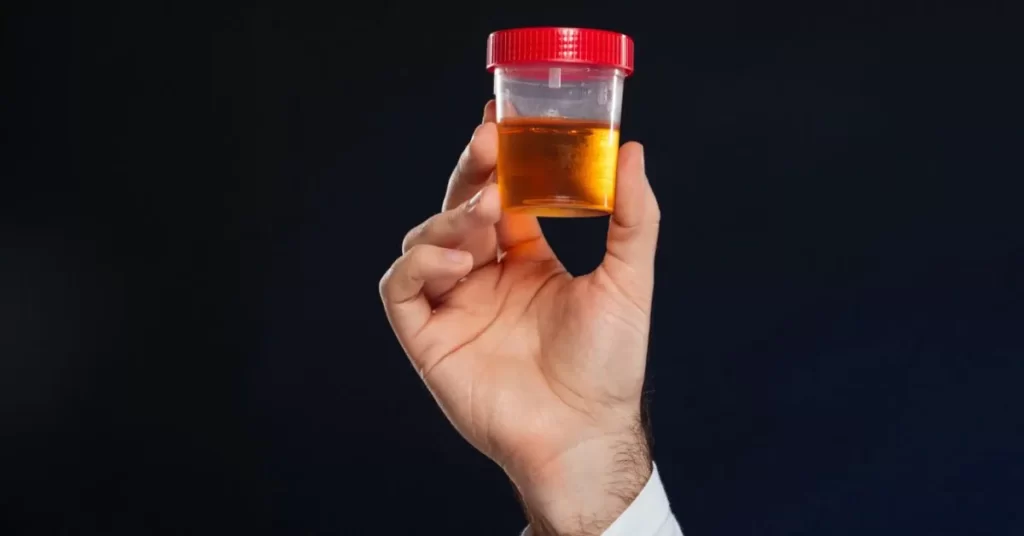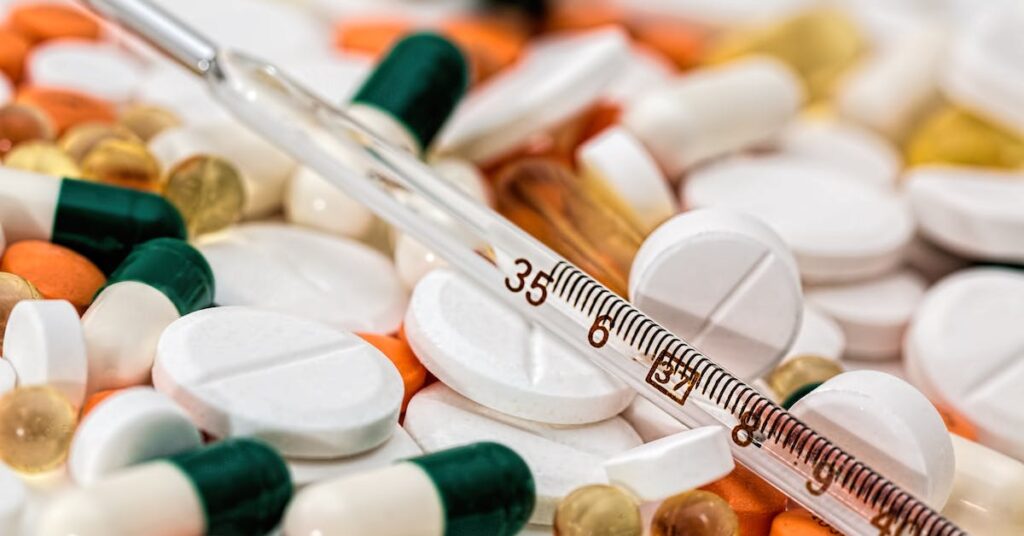
Small blood clots in urine refer to tiny, gelatinous masses resembling clots, which may be visible during urination. These clots are often indicative of bleeding within the urinary tract. It’s essential to differentiate between small blood clots and other urinary abnormalities, such as sediment or discoloration, to assess the underlying cause accurately.
Understanding the visual characteristics of these clots is crucial. They may appear as red or brown particles, varying in size and consistency. The size of these clots can range from almost microscopic to more discernible masses. While the sight of blood in urine can be alarming, comprehending the specific nature of small blood clots aids in a more precise diagnosis.
1. What Causes Small Blood Clots in Urine
- Urinary Tract Infections (UTIs): Urinary Tract Infections (UTIs) are a common culprit behind blood clots in urine, often accompanied by discomfort during urination. These infections, caused by bacteria entering the urinary system, create an environment where blood vessels can be affected, leading to bleeding. Understanding the link between bacterial infections and urinary symptoms is vital for early detection and effective management.
- Kidney Stones: The formation of kidney stones can provoke irritation and damage within the urinary tract, resulting in the appearance of blood clots during urination. These small, crystalline deposits can cause abrasions as they pass through the urinary system, leading to bleeding. Recognizing the connection between kidney stones and blood clots is crucial for diagnosis and determining appropriate treatment strategies.
- Bladder Infections: Infections affecting the bladder can present as small blood clots in urine. The presence of bacteria in the bladder can lead to inflammation and bleeding, contributing to the formation of clots. Prompt identification and treatment of bladder infections are essential to prevent complications and alleviate urinary symptoms associated with blood clots.
- Trauma or Injury: Physical trauma or injury to the urinary system can be a catalyst for the development of blood clots. Any external force that impacts the urinary organs may result in bleeding, leading to lumps during urination. This highlights the importance of caution and preventive measures, particularly when the risk of injury is elevated.
- Blood Disorders: Certain blood disorders can play a role in the occurrence of blood clots in urine. Conditions affecting blood clotting mechanisms may result in abnormal bleeding within the urinary tract. Exploring these connections not only aids in understanding the specific health implications but also guides healthcare professionals in developing targeted interventions to manage blood disorders and associated urinary symptoms.
Understanding these common causes gives individuals valuable insights into the potential origins of small blood clots in urine. Timely recognizing these factors is pivotal for effective medical intervention and the formulation of tailored treatment plans to address the underlying causes.
2. Gender-Specific Factors of small blood clots in urine

A. What causes small blood clots in urine in females?
Small blood clots in urine in females can be attributed to various factors, often linked to reproductive health and the unique physiology of the female urinary and reproductive systems. Here are some key contributors:
- Menstrual Cycle: Hormonal fluctuations during the menstrual cycle can impact the urinary tract. Changes in hormone levels may influence the lining of the urethra and bladder, potentially leading to bleeding and the formation of small blood clots.
- Menstrual Disorders: Women with certain menstrual disorders, such as menorrhagia (heavy menstrual bleeding), may experience increased blood clotting not only in the reproductive organs but also in the urinary system.
- Urinary Tract Infections (UTIs): Infections in the urinary tract can cause irritation and inflammation, leading to bleeding and the appearance of blood clots in urine. Women are more prone to UTIs due to the shorter length of the urethra.
- Pregnancy: Passing small blood clots in early pregnancy can be linked to changes associated with increased blood flow to the pelvic area and hormonal shifts. It is crucial for pregnant women experiencing this symptom to consult their healthcare provider for proper evaluation and guidance.
- Uterine Conditions: Conditions affecting the uterus, such as fibroids or endometriosis, can indirectly influence the urinary tract, potentially leading to bleeding and the presence of small blood clots.
- Reproductive Organ Infections: Infections specific to the female reproductive organs, such as vaginitis or cervicitis, can extend to the urinary tract, causing bleeding and clot formation.
- Postmenopausal Changes: Women in the postmenopausal stage may experience changes in the urinary system’s mucous membranes due to decreased estrogen levels, making them more susceptible to bleeding and clotting.
Understanding these potential causes is vital for healthcare professionals to provide accurate diagnoses and tailored treatment plans for women experiencing small blood clots in urine. Any persistent or concerning symptoms should prompt a consultation with a healthcare provider for a thorough evaluation and appropriate management.
B. What causes small blood clots in urine in males?

Small blood clots in urine in males can be attributed to various factors related to the male urinary and reproductive systems. Here are some potential causes:
- Prostate Conditions: Enlargement or inflammation of the prostate gland, a common issue in men, can impact urinary function and contribute to the presence of blood clots in urine.
- Urinary Tract Infections (UTIs): Infections in the urinary tract, including the bladder or urethra, can cause irritation and bleeding, leading to the formation of small blood clots during urination.
- Kidney Stones: The development of kidney stones can result in damage to the urinary tract, causing bleeding and the appearance of blood clots in urine.
- Injuries or Trauma: Physical trauma or injury to the male reproductive organs or the urinary system can be a catalyst for the development of blood clots.
- Sexually Transmitted Infections (STIs): Certain STIs can affect the urinary tract, leading to inflammation and bleeding, which may result in the presence of blood clots in urine.
- Blood Disorders: Conditions affecting blood clotting mechanisms may contribute to abnormal bleeding within the urinary tract, leading to the formation of blood clots.
- Cancer: In rare cases, cancers affecting the urinary or reproductive organs, such as bladder or prostate cancer, may cause bleeding and the appearance of blood clots in urine.
- Medications: Certain medications or treatments, such as anticoagulants, can increase the risk of bleeding and the formation of blood clots in the urine.
Suppose a man is experiencing small blood clots in urine. In that case, it is essential to consult a healthcare provider for a thorough evaluation. Only through proper diagnosis can the underlying cause be identified, leading to appropriate treatment and management strategies. Ignoring such symptoms may lead to complications, making early medical intervention crucial for urinary health.
3. Symptoms and Detection of Small Blood Clots in Urine

A. Visible Signs
- Discoloration of Urine: Small blood clots in urine may cause a noticeable color change, appearing pink, red, or brown. This discoloration is a visible sign that blood is present, signaling the need for further investigation.
- Visible Clots in Urine: Small clots, often resembling tiny gelatinous masses, can be observed during urination. This visual symptom clearly indicates blood clotting within the urinary tract.
- Pain or Discomfort: Individuals may experience pain or discomfort during urination, a symptom associated with blood clots. This discomfort can range from mild to severe, depending on the underlying cause.
- Frequency of Urination: Changes in urinary habits, such as an increased frequency of urination, may accompany the presence of small blood clots. Monitoring changes in urination patterns is crucial for early detection.
B. Diagnostic Procedures
- Urinalysis: A fundamental diagnostic tool, urinalysis involves examining a urine sample. It helps identify the presence of blood cells, proteins, or other abnormalities that could indicate the existence of small blood clots.
- Imaging Studies: Ultrasound, CT scans, or MRI may be employed to visualize the urinary tract. These imaging studies can reveal structural abnormalities, such as kidney stones or tumors, contributing to blood clot formation.
- Cystoscopy: A cystoscopy involves using a thin, flexible tube with a camera to examine the inside of the urethra and bladder. This procedure helps identify any abnormalities, inflammation, or sources of bleeding.
- Blood Tests: Blood tests, including clotting factor assessments, may be conducted to determine if underlying blood disorders contribute to the formation of blood clots in urine.
- Urodynamic Testing: In cases of urinary function concerns, urodynamic testing assesses how well the bladder and urethra store and release urine. This can help identify issues contributing to blood clot formation.
- Biopsy: When cancer is suspected, a biopsy may be performed to collect tissue samples for examination. This aids in confirming or ruling out malignancies as the cause of blood clots in urine.
Understanding visible signs and diagnostic procedures is crucial for a comprehensive approach to detecting small blood clots in urine. Timely and accurate diagnosis allows healthcare professionals to determine the underlying causes and implement targeted treatment strategies, promoting urinary health. Individuals experiencing symptoms should promptly seek medical attention for a thorough evaluation.
4. Medical Conditions Linked to Small Blood Clots in Urine

A. Hematuria: Hematuria refers to the presence of blood in the urine. It can manifest as visible red or brown discoloration or be microscopic, detectable only under a microscope. Hematuria can result from various factors, and the presence of small blood clots is one of its potential manifestations.
- Urinary Tract Infections (UTIs): Infections in the urinary tract can lead to hematuria and the formation of small blood clots.
- Kidney Stones: The passage of kidney stones through the urinary tract can cause irritation and bleeding, contributing to the presence of blood clots.
- Inflammatory Conditions: Conditions like interstitial cystitis or other inflammatory disorders may cause hematuria with associated blood clots.
B. Glomerulonephritis: Glomerulonephritis is an inflammation of the glomeruli, which are small kidney units that filter blood. In cases of glomerulonephritis, the filtering function can be compromised, leading to blood in the urine, often accompanied by small clots.
- Immune System Disorders: Conditions where the immune system attacks the glomeruli, such as lupus or certain vasculitis, can result in glomerulonephritis.
- Infections: Some infections, particularly those affecting the throat or skin, can trigger glomerulonephritis.
- Hypertension: Prolonged high blood pressure can damage the glomeruli, contributing to the development of glomerulonephritis.
C. Bladder Cancer: Bladder cancer involves the abnormal growth of cells in the bladder lining. As the cancer progresses, it can lead to bleeding within the bladder, causing the presence of blood clots in the urine.
- Smoking: Tobacco smoke contains carcinogens that increase the risk of developing bladder cancer.
- Chemical Exposure: Prolonged exposure to certain chemicals, especially in specific occupational settings, may elevate the risk of bladder cancer.
- Chronic Bladder Inflammation: Conditions causing chronic inflammation of the bladder, such as recurrent infections, may contribute to the development of bladder cancer.
Understanding these medical conditions linked to small blood clots in urine is essential for individuals and healthcare professionals. Recognizing and diagnosing the underlying disease is crucial for implementing appropriate treatment strategies and managing the associated symptoms. Individuals experiencing persistent symptoms should seek medical attention for a thorough evaluation and diagnosis.
5. Treatment Options for Small Blood Clots in Urine

A. Antibiotics for Infections
- Role of Antibiotics: When small blood clots in urine are linked to infections, such as urinary tract infections (UTIs), antibiotics play a pivotal role in treatment. Antibiotics target and eliminate the bacteria causing the infection, preventing further damage to the urinary tract and reducing the risk of clot formation. It is essential for healthcare providers to prescribe the appropriate antibiotic based on the specific bacteria involved, ensuring effective and targeted treatment.
- Importance of Timely Treatment: Initiating antibiotic treatment promptly is crucial to prevent infection spread and blood clots’ recurrence. Delayed or inadequate antibiotic therapy can lead to complications and a prolonged recovery period. Regular follow-ups with healthcare providers help monitor the antibiotics’ effectiveness and ensure the infection’s complete resolution.
B. Pain Management
- Addressing Discomfort: Managing pain associated with urinary conditions, including blood clots, is integral to comprehensive care. Nonsteroidal anti-inflammatory drugs (NSAIDs) or other pain relievers may be recommended to alleviate discomfort during urination. Healthcare providers tailor pain management strategies based on the severity of symptoms and individual patient needs.
- Supportive Measures: In addition to medication, implementing supportive measures such as warm compresses, adequate hydration, and avoiding irritants can contribute to pain relief. Patient education on lifestyle adjustments and self-care practices enhances the overall management of pain associated with small blood clots in urine.
C. Surgical Interventions
- Addressing Underlying Causes: In cases where blood clots result from underlying structural issues like kidney stones, tumors, or other abnormalities, surgical interventions may be necessary. Procedures such as lithotripsy (breaking down kidney stones), cystoscopy (examining the bladder and urethra), or tumor removal can effectively address the root causes of blood clot formation.
- Timing and Considerations: The timing of surgical interventions depends on the specific diagnosis and the urgency of the underlying condition. Urgent cases, such as kidney stones causing severe pain or obstruction, may require immediate intervention. In contrast, elective surgeries for non-emergent conditions are planned to address the underlying cause and prevent the recurrence of blood clots.
- Post-Surgical Care: Post-surgical care involves monitoring for any signs of complications, ensuring proper healing, and providing guidance on recovery. Surgical interventions aim to eliminate existing blood clots and prevent their reoccurrence, promoting long-term urinary health.
Understanding these treatment options is crucial for healthcare providers and individuals experiencing small blood clots in urine. Tailoring the approach based on the specific underlying causes ensures effective management. It contributes to the overall well-being of individuals dealing with urinary conditions. Regular communication between patients and healthcare providers enhances the success of treatment plans. It supports a comprehensive approach to urinary health.
6. Prevention Strategies for Small Blood Clots in Urine

A. Hydration Importance
- Adequate Fluid Intake:Emphasizing the importance of hydration is a fundamental preventive measure against small blood clots in urine. Maintaining adequate fluid intake helps dilute urine, reducing the risk of concentrated urine and the formation of clots. Water, herbal teas, and clear broths are excellent choices to support proper hydration.
- Monitoring Urine Color: Encouraging individuals to monitor the color of their urine is a simple yet effective practice. Clear or light yellow urine indicates good hydration. In contrast, dark or concentrated urine may suggest a need for increased fluid intake. They regularly observe urine color, which aids in staying proactive about hydration.
B. Regular Medical Check-ups
- Early Detection and Intervention: Promoting regular medical check-ups is crucial for the early detection and intervention of factors that may lead to small blood clots in urine. Routine check-ups allow healthcare providers to monitor urinary health, identify potential issues, and implement preventive measures before they escalate. Early intervention contributes significantly to overall urinary well-being.
- Screening for Risk Factors: Regular check-ups also involve screening for risk factors such as urinary tract infections, kidney stones, or other conditions that may predispose individuals to blood clot formation. Identifying these risk factors early enables healthcare providers to devise personalized preventive strategies.
C. Healthy Lifestyle Practices
- Exercise and Physical Activity: Promoting regular exercise and physical activity supports overall urinary health. Physical movement aids in maintaining healthy blood circulation, reducing the risk of blood clot formation. Activities like walking, jogging, or pelvic floor exercises contribute to optimal urinary function.
- Stress Management: Stress can negatively impact various bodily functions, including the urinary system. Encouraging stress management practices, such as meditation, deep breathing exercises, or yoga, can mitigate the effects of stress on urinary health and reduce the likelihood of blood clot development.
- Balanced Diet: A balanced diet is pivotal in preventing small blood clots in urine. Including foods rich in antioxidants, vitamins, and minerals supports the overall health of the urinary tract. Dietary choices that promote kidney function and maintain a healthy bladder contribute to a lower risk of blood clot formation.
7. Lifestyle and Dietary Factors in the Formation of Small Blood Clots in Urine

A. Dehydration
- Role of Dehydration: Examining the role of dehydration reveals its connection to the formation of blood clots in urine. Insufficient fluid intake leads to concentrated urine, increasing the likelihood of clot development. Dehydration can cause the urinary components to become more focused, promoting the aggregation of substances that may form clots. It is essential to recognize the impact of dehydration on urinary health.
- Significance of Optimal Hydration: Emphasizing the significance of maintaining optimal hydration levels is crucial for preventing small blood clots in urine. A well-hydrated body ensures that urine remains adequately diluted, reducing the risk of clot formation. Encouraging individuals to drink adequate water throughout the day is a simple yet effective preventive measure against urinary issues associated with dehydration.
B. Diet and Nutrition
- Impact of Diet on Urinary Health: Understanding the impact of diet and nutrition on urinary health unveils the intricate connection between dietary choices and preventing small blood clots in urine. Certain foods can contribute to a healthy urinary tract, while others may increase the risk of clot formation. Diets high in salt, processed foods, and refined sugars may negatively affect urinary function, emphasizing the importance of mindful dietary choices.
- Dietary Adjustments for Prevention: Exploring dietary adjustments to help prevent tiny blood clots involves promoting a balanced and kidney-friendly diet. Incorporating fruits, vegetables, whole grains, and lean proteins supports overall urinary well-being. Foods rich in antioxidants, such as berries and leafy greens, reduce inflammation and promote a healthy urinary system.
- Limiting Foods that Contribute to Clotting: Identifying and limiting foods contributing to blood clotting is essential for preventing urinary issues. For instance, excessive red meat or foods high in oxalates can increase the risk of kidney stones and clot formation. A balanced and varied diet and moderation in specific food choices play a crucial role in maintaining urinary health.
8. What Causes Small Blood Clots in Urine During Pregnancy

A. Common Causes
- Hormonal Changes: Hormonal fluctuations during pregnancy can impact the urinary tract, potentially leading to the appearance of small blood clots. Increased blood flow to the pelvic area and changes in hormone levels may contribute to this phenomenon.
- Urinary Tract Infections (UTIs): Pregnant women are more susceptible to urinary tract infections, which can cause irritation and bleeding, resulting in blood clots in the urine.
- Kidney Stones: The development of kidney stones is not uncommon during pregnancy. As these stones pass through the urinary tract, they can cause irritation and bleeding, forming blood clots.
- Uterine Conditions: Conditions affecting the uterus, such as fibroids or endometriosis, may indirectly impact the urinary tract, contributing to bleeding and the appearance of small blood clots.
- Increased Pressure on the Bladder: The growing uterus can exert pressure on the bladder, potentially causing minor injuries or irritation that result in bleeding and the formation of clots in the urine.
B. Precautions and Care
- Regular Prenatal Check-ups: Regular prenatal check-ups are crucial for monitoring maternal health, including urinary concerns. Healthcare providers can detect and address any issues early, ensuring the well-being of both the mother and the developing baby.
- Stay Hydrated: Maintaining optimal hydration is essential during pregnancy. It helps prevent dehydration-related complications and dilutes the urine, reducing the risk of clot formation. Pregnant women should aim to drink an adequate amount of water daily.
- Prompt Treatment of Infections: If a urinary tract infection is suspected, immediate medical attention and treatment are essential. Untreated infections can lead to complications, and managing them early helps prevent the formation of blood clots.
- Dietary Considerations: Following a well-balanced diet that supports urinary health is essential. Foods rich in nutrients and low in potential irritants contribute to overall well-being.
- Avoid Self-Medication: Pregnant women should avoid self-medicating and should only take medications prescribed or approved by their healthcare provider. Some medicines may have adverse effects during pregnancy, emphasizing the importance of professional guidance.
- Report Changes to Healthcare Provider: Any changes in urinary habits, including blood clots, should be promptly reported to the healthcare provider. Open communication ensures timely intervention and appropriate care.
In summary, understanding the common causes and taking precautions and care are vital for managing small blood clots in urine during pregnancy. Regular monitoring, hydration, prompt treatment of infections, and adherence to healthcare provider guidance contribute to a healthy pregnancy and urinary well-being. Pregnant women should prioritize their health and seek professional advice for any concerns during this crucial time.
9. Conclusion
In unraveling what causes small blood clots in urine, we’ve explored various factors, from common medical conditions to lifestyle influences. Seeking professional guidance, maintaining a healthy lifestyle, and understanding gender-specific considerations are crucial for managing and preventing small blood clots in urine. Remember, early intervention and a holistic approach contribute to better outcomes in urinary health.
10. Frequently Answered Questions (FAQ’s)
1. What are the common symptoms of small blood clots in urine?
Common symptoms include pain during urination, visible blood in urine, and small clots.
2. Can dehydration lead to the formation of blood clots in urine?
Yes, dehydration can contribute to developing concentrated urine, increasing the likelihood of blood clot formation.
3. Is it normal to have small blood clots during pregnancy?
While some changes in urine are regular during pregnancy, it’s essential to consult a healthcare provider if small blood clots are observed.
4. How are kidney stones linked to blood clots in urine?
Kidney stones can cause irritation and damage to the urinary tract, leading to the presence of blood clots during urination.
5. What lifestyle changes can prevent recurrent small blood clots?
Hydration, a balanced diet, and regular medical check-ups can help prevent recurrent small blood clots in urine.


